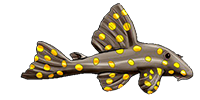/siluriformes/loricariidae/hypancistrus/sp%28l066%29/1.jpg)
/siluriformes/loricariidae/hypancistrus/sp%28l066%29/2.jpg) Close-up of head, male
Close-up of head, male/siluriformes/loricariidae/hypancistrus/sp%28l066%29/3.jpg) Male
Male/siluriformes/loricariidae/hypancistrus/sp%28l066%29/4.jpg) Juvenile
Juvenile/siluriformes/loricariidae/hypancistrus/sp%28l066%29/5.jpg) Pair spawning
Pair spawning/siluriformes/loricariidae/hypancistrus/sp%28l066%29/6.jpg)
/siluriformes/loricariidae/hypancistrus/sp%28l066%29/7.jpg) Feeding on prawns
Feeding on prawns/siluriformes/loricariidae/hypancistrus/sp%28l066%29/8.jpg) Close-up of head of female
Close-up of head of female/siluriformes/loricariidae/hypancistrus/sp%28l066%29/9.jpg)
/siluriformes/loricariidae/hypancistrus/sp%28l066%29/10.jpg) Male with brood
Male with brood/siluriformes/loricariidae/hypancistrus/sp%28l066%29/11.jpg) Male guarding eggs in pipe cave
Male guarding eggs in pipe cave/siluriformes/loricariidae/hypancistrus/sp%28l066%29/12.jpg)
/siluriformes/loricariidae/hypancistrus/sp%28l066%29/13.jpg)
/siluriformes/loricariidae/hypancistrus/sp%28l066%29/14.jpg) Juveniles in spawning cave
Juveniles in spawning cave/siluriformes/loricariidae/hypancistrus/sp%28l066%29/15.jpg) Close-up of head of male
Close-up of head of male Video
Video/siluriformes/loricariidae/hypancistrus/sp%28l066%29/17.jpg)
/siluriformes/loricariidae/hypancistrus/sp%28l066%29/18.jpg) Young juvenile
Young juvenile/siluriformes/loricariidae/hypancistrus/sp%28l066%29/19.jpg) Fry with yolk sac
Fry with yolk sac/siluriformes/loricariidae/hypancistrus/sp%28l066%29/20.jpg) Three week old L260 and four week old L066 (top)
Three week old L260 and four week old L066 (top)/siluriformes/loricariidae/hypancistrus/sp%28l066%29/21.jpg) Eggs of L066(right) and L046
Eggs of L066(right) and L046/siluriformes/loricariidae/hypancistrus/sp%28l066%29/22.jpg)
/siluriformes/loricariidae/hypancistrus/sp%28l066%29/23.jpg) Youngster
Youngster/siluriformes/loricariidae/hypancistrus/sp%28l066%29/24.jpg)
/siluriformes/loricariidae/hypancistrus/sp%28l066%29/25.jpg) Three month old juvenile
Three month old juvenile/siluriformes/loricariidae/hypancistrus/sp%28l066%29/26.jpg) Female
Female/siluriformes/loricariidae/hypancistrus/sp%28l066%29/27.jpg)
/siluriformes/loricariidae/hypancistrus/sp%28l066%29/28.jpg) Two day old fry
Two day old fry/siluriformes/loricariidae/hypancistrus/sp%28l066%29/29.jpg)
/siluriformes/loricariidae/hypancistrus/sp%28l066%29/30.jpg) Ventral view
Ventral view/siluriformes/loricariidae/hypancistrus/sp%28l066%29/31.jpg) Dorsal view
Dorsal view/siluriformes/loricariidae/hypancistrus/sp%28l066%29/32.jpg)
| Scientific Name | Hypancistrus sp. (L066) , 1990 |
| Common Names | L066, King Tiger Pleco Acari Pão (Brazilian), Finbroderet Sugemalle (Danish), Network Pleco, Scribbled Pleco |
| Type Locality | Lower Xingú or Tocantins, Pará, Brazil |
| Pronunciation | hype an siss truss |
| Etymology | A contraction of the Greek hypo (meaning less than) and ancistrus, an allusion to the reduced number of teeth (particularly in the lower jaw) found in this genus. |
| Articles | |
| Size | 120mm or 4.7" SL. Find near, nearer or same sized spp. |
| Identification | A distinctive L number that is most often confused with a few other similarly patterned species, such as L333, L318, L399, L400 and L401. Youngsters however are quite different from the adults. Both fishes have a light base with dark lines. L066 has a paler base colouration than L333 where L333 has a yellow/light brown base colouration, and more slender. Both L066 and L333 are from Rio Xingu L066 has even/straight lines in the fins, other similar fish do not L318 and L401 comes from different rivers other than RIo Xingu, so if capture location is available, then the difference is very obvious. Both of these fishes have a dark base colouration with lighter lines. L318 also has more wide areas of dark colour and the lighter lines are often broken. L401 has narrower dark areas, but still many broken lines. |
| Sexing | Adult males develope teeth-like odontodes around the head and the pectoral fins. Viewed from above the female looks much more massive than the male. |
| Distribution | Lower Xingu. Amazon, Lower Amazon, Tocantins (click on these areas to find other species found there) Amazon, Lower Amazon, Xingu (click on these areas to find other species found there) Login to view the map. |
| pH | 5.8 - 7.0 |
| Temperature | 25.0-29.0°C or 77-84.2°F (Show species within this range) |
| Other Parameters | This fish prefers good current and high oxygen levels. |
| Feeding | Carnivore - feed with bloodworms, mussel, sinking prepared food (such as Tetra bits), carnivore wafers, shrimp pellets and so on. User data. |
| Furniture | A hiding space for each fish is required. |
| Compatibility | Somewhat territorial towards conspecifics. |
| Suggested Tankmates | Small tetras and other similar small fish. Also Corydoras. Care has to be taken to ensure that they get enough food, as they can be a bit shy and slow to grab food when available. |
| Breeding | See Shane's World article link below. |
| Breeding Reports | There are 27 breeding reports, read them all here. |
| Registered Keepers | There are 514 registered keepers, view all "my cats" data. |
| Wishlists | Love this species? Click the heart to add it to your wish list. There are 16 wishes to keep this species, see who wants what. |
| Spotters | Spotted this species somewhere? Click the binoculars! There are 118 records of this fish being seen, view them all. |
| Forum BBCode | |
| Search for H. sp. (L066) | |
| Look up H. sp. (L066) on AquaticRepublic.com | |
| LFS label creator ARN ref:1.4.7.174 | |
| Last Update | 2020 Oct 05 12:32 (species record created: 2001 May 05 00:00) |




